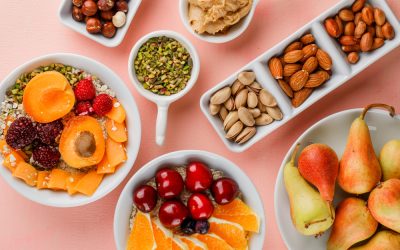During Ramadan, maintaining a healthy lifestyle while fasting can be challenging. However, with mindful eating, portion control, and staying hydrated, it’s possible to manage weight effectively. Incorporating nutritious foods, light exercises, and adequate sleep can further support weight loss goals during this holy month.
10 Ramadan Weight Loss Tips with Diet Plan
Here are some diet tips to stay healthy during Ramadan, including balanced meals, hydration, portion control, and making healthy choices.
1) Balanced Meals
During Ramadan, balanced meals are crucial during Suhoor and Iftar to sustain energy levels and promote overall health. Incorporate a variety of food groups, including fruits, vegetables, lean proteins, and whole grains, to provide essential nutrients. Aim for a combination of complex carbohydrates, lean proteins, and healthy fats to keep you feeling satisfied and energized throughout the fasting period.
Avoid overeating by practicing portion control and listening to your body’s hunger cues. By planning balanced meals, you can support your physical well-being and maintain stable energy levels throughout the day.

2) Hydration
Staying hydrated is essential during Ramadan to prevent dehydration while fasting. Drink plenty of water between Iftar and Suhoor to replenish fluids lost during the day. Opt for hydrating foods such as watermelon, cucumbers, and soups to boost hydration levels. Avoid caffeinated and sugary beverages as they can lead to dehydration.
Remember to pace your water intake throughout the evening to avoid feeling too full during Suhoor. By prioritizing hydration, you can support your body’s functions, maintain energy levels, and stay healthy throughout the fasting period.
3) Portion Control
During Ramadan, practicing portion control is crucial to avoid overeating when breaking your fast. Be mindful of your portion sizes and aim to fill half of your plate with vegetables, one-quarter with lean protein, and one-quarter with carbohydrates. Avoid going back for seconds and listen to your body’s hunger cues to prevent overeating. Eating slowly and savoring each bite can also help you feel more satisfied with smaller portions. By practicing portion control, you can maintain a healthy balance of nutrients and prevent unnecessary weight gain during Ramadan.
4) Healthy Choices
5) Moderate Sweets
During Ramadan, it’s important to moderate your intake of sweets and high-calorie desserts to avoid spikes in blood sugar levels. While it’s tempting to indulge in traditional sweets during Iftar or Suhoor, try to limit these treats to occasional indulgences rather than daily staples. Opt for healthier alternatives like fresh fruits or homemade desserts made with natural sweeteners. By moderating your consumption of sugary foods, you can better manage your energy levels and prevent unwanted fluctuations in blood sugar, ultimately supporting your overall health during the fasting period.

6) Physical Activity
Staying active during Ramadan is crucial for maintaining overall health and well-being. Incorporating light exercises and walks after Iftar or before Suhoor can help keep your body moving and promote physical fitness. Aim for activities that are gentle on the stomach and don’t require intense exertion, such as walking, stretching, or yoga. These exercises can help improve circulation, boost metabolism, and alleviate any stiffness or fatigue associated with fasting. Additionally, staying active can also enhance your mood and energy levels, making it easier to navigate the demands of the fasting period. Just remember to listen to your body and avoid strenuous activities during fasting hours.
Learn more about How to increase running stamina for Beginners?
7) Sleep Routine
A consistent sleep routine is essential during Ramadan to support overall health and weight management. Aim to maintain regular sleeping hours, even during the fasting period, to ensure you get adequate rest. Prioritize quality sleep by creating a comfortable sleeping environment, minimizing screen time before bed, and practicing relaxation techniques. Sufficient sleep helps regulate hormones that control appetite and metabolism, reducing the risk of overeating and weight gain. Additionally, adequate rest supports mental clarity, energy levels, and mood, making it easier to adhere to healthy habits during Ramadan. Prioritize sleep as part of your holistic approach to wellness during this sacred month.
8) Mindful Eating
Mindful eating is crucial during Ramadan to promote healthy habits and prevent overeating. Instead of rushing through meals, take the time to savor each bite and pay attention to your body’s hunger cues. Eat slowly and mindfully, focusing on the flavors and textures of your food, rather than distractions like screens or conversation. By being present during meals, you’re more likely to recognize when you’re satisfied, preventing the urge to overeat. Mindful eating fosters a deeper connection with your body and food, promoting better digestion, satisfaction, and overall well-being during this sacred month of Ramadan.
9) Avoid Fried Foods
During Ramadan, it’s essential to minimize the consumption of fried and oily foods. While they may be tempting, fried foods are often high in calories and unhealthy fats, which can lead to weight gain and other health issues. Instead, focus on healthier cooking methods like baking, grilling, or steaming to reduce the amount of oil used in your meals. Opt for nutrient-rich alternatives like grilled chicken, baked fish, or steamed vegetables to satisfy cravings without compromising your health. By making mindful food choices, you can support your well-being and maintain a balanced diet throughout the holy month of Ramadan.
10) Seek Support
Seeking support from family and friends can be invaluable during Ramadan. Surrounding yourself with individuals who encourage healthy eating habits and motivate you to stay active can make it easier to maintain your health goals during fasting. Share your wellness journey with loved ones and involve them in meal planning and physical activities. Having a supportive network can provide accountability and motivation, making it easier to stick to your health and fitness routine throughout the holy month. Together, you can celebrate successes, overcome challenges, and make Ramadan a time of growth and well-being for everyone involved.




